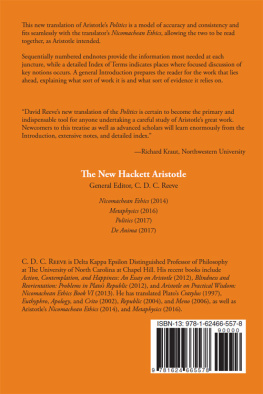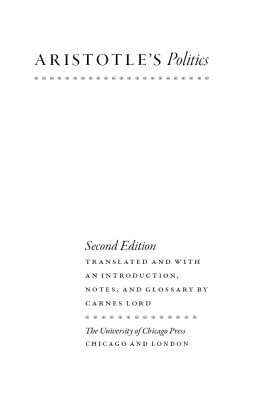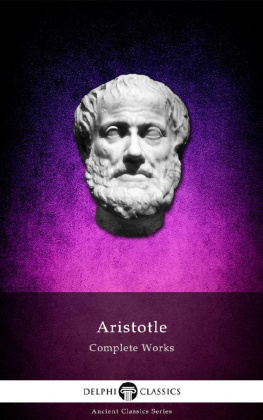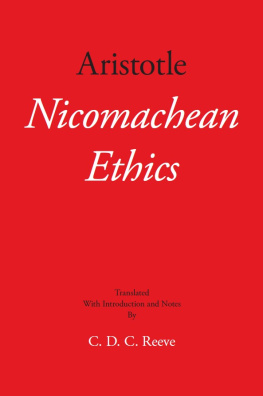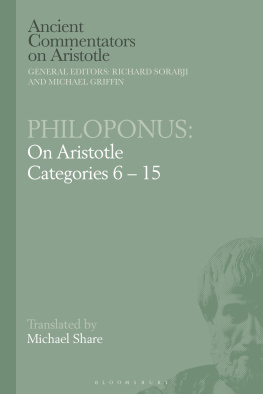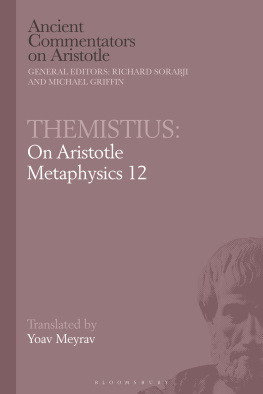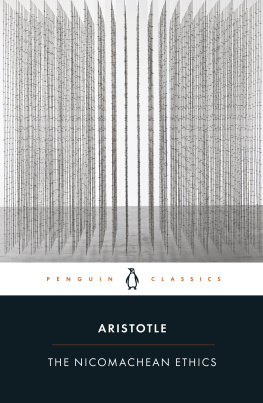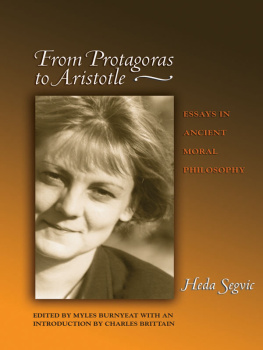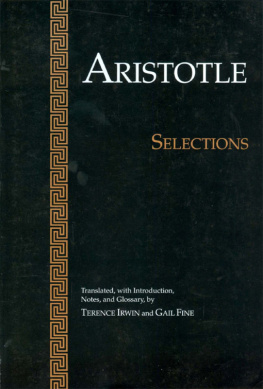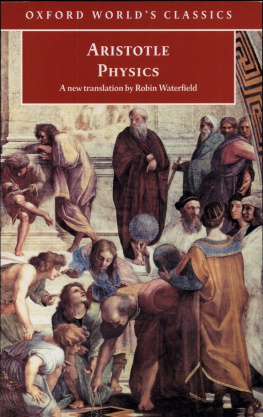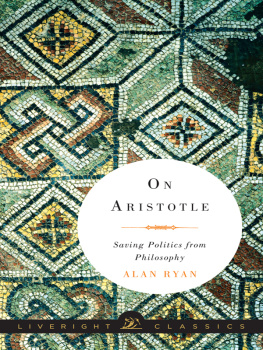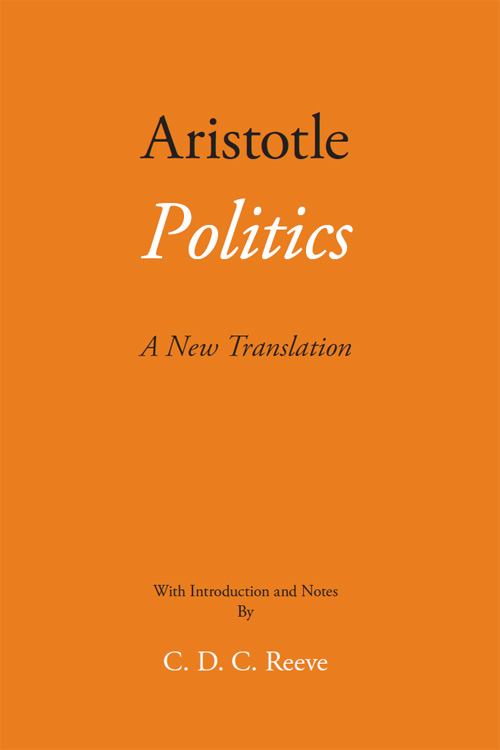Aristotle
Politics
Aristotle
Politics
A New Translation
With Introduction and Notes
By
C. D. C. Reeve
Hackett Publishing Company, Inc.
Indianapolis/Cambridge
Copyright 2017 by Hackett Publishing Company, Inc.
All rights reserved
Printed in the United States of America
20 19 18 17 1 2 3 4 5 6 7
For further information, please address
Hackett Publishing Company, Inc.
P.O. Box 44937
Indianapolis, Indiana 46244-0937
www.hackettpublishing.com
Cover design by Deborah Wilkes
Interior design by Elizabeth L. Wilson
Composition by Aptara, Inc.
Library of Congress Cataloging-in-Publication Data
Names: Aristotle. | Reeve, C. D. C., 1948
Title: Politics : a new translation / Aristotle ; with introduction and notes by C. D. C. Reeve.
Other titles: Politics. English
Description: Indianapolis, Indiana : Hackett Publishing Company, Inc., [2017] | Series: The new Hackett Aristotle | Includes bibliographical references and index.
Identifiers: LCCN 2016047055| ISBN 9781624665578 (pbk.) | ISBN 9781624665585 (cloth)
Subjects: LCSH: Political scienceEarly works to 1800.
Classification: LCC JC71.A41 R4413 2017 | DDC 320.01/1dc23
LC record available at https://lccn.loc.gov/2016047055
epub ISBN: 978-1-62466-609-4
For
Deborah Wilkes, Jay Hullett,
&
all at Hackett
Aristotle, Metaphysics . Translated, with Introduction and Notes, by C. D. C. Reeve.
Aristotle, Nicomachean Ethics . Translated, with Introduction and Notes, by C. D. C. Reeve.
Contents
The page numbers in curly braces {} correspond to the print edition of this title.
{xiii}
This book is a descendant of a translation of the Politics published by Hackett in 1988. But it is not the result of making spot revisions to its ancestor. Instead it is an entirely new translation, built from the ground up, and very different in scale and level of annotation from its predecesor. My reason for producing it is in the first instance to have a translation that is in harmony with my Nicomachean Ethics (2014), so that readers can more easily read the Ethics and then the Politics as a relatively seamless whole. The final chapter of the Ethics suggests that this is what Aristotle himself intended. A second reason is that readers of the Politics find themselves in territory whose apparent familiarity is often deceptive and inimical to proper understanding: politik isnt quite politics, epistm isnt quite science, praxis isnt quite action, theria isnt quite theory, eudaimonia isnt quite happiness, ergon isnt quite function, aret isnt quite virtue, a politiea isnt quite a constitution, and a polis isnt quite a city. A translation must try to compensate for this deceptive familiarity, therefore, without producing too much potentially alienating distance and strangeness in its place. Accuracy and consistency are essential to achieving this goal, obviously, and I think that I can now do quite a bit better in these regards than I did before. Indeed, the 1988 version, while sufficiently useful for many purposes to be kept in print, falls short, in my view, of what is required for serious study of this extraordinary work. It is my hope and expectation that this one will eventually replace it entirely.
In addition to accuracy and consistency, extensive annotation and commentary are of the first importance. Some of this can consist, as it does here, of texts selected from other works by Aristotle, so that, while traveling through the region of the Aristotelian world that the Politics describes, readers can also travel through other regions of it, acquiring an ever widening and deepening grasp on the whole picturesomething that is crucial, in my view, to understanding any part of it adequately or perhaps at all. But much commentary must simply be explanatory, clarificatory, and interpretative.
To make the journey a convenient one, footnotes and glossary entries are replaced by sequentially numbered endnotes, so that the information most needed at each juncture is available in a single location. The non-sequential reader interested in a particular topic will find in the Indexes a guide to places where focused discussion of it occurs. The Introduction describes the book that lies ahead, explaining what it is about, what it is trying to do, {xiv} what sort of evidence is relevant to its evaluation, and what sort of person has access to such evidence. It is not a comprehensive discussion of all the important topics the Politics contains, nor an attempt to situate Aristotles thought in the history of political thought more generally. Many books are available that attempt these tasks. Nor is it, I should add, an expression of scholarly consensus on the topics it does discussinsofar as such a thing existsbut rather my own take on them.
I have benefited from the work of previous translators and commentators, especially Carnes Lord and Peter Simpson (into English) and Pierre Pellegrin (into French). The translations in the Clarendon Aristotle Series have also been very helpful, especially those of David Keyt (Books V and VII), Richard Kraut (Books VIII and IX), and Trevor Saunders (Books I and II), as have the translations of parts of the Politics by Terence Irwin.
I thank Pavlos Kontos and David Riesbeck for their careful line reading, as well as for their many useful comments, suggestions, and corrections. Davids own work on the Politics in particular has been a frequent stimulus to new thought on my part.
I renew my thanks to KE, the first fraternity in the United States to endow a professorial chair, and to the University of North Carolina for awarding it to me. The generous research funds, among other things, that the endowment makes available each year have allowed me to travel to conferences and to acquire books, computers, and other research materials and assistance, without which my work would have been much more difficult.
Finally and wholeheartedly, I thank Jay Hullett and Deborah Wilkes for their friendship, encouragement, and faith in me. It is a pleasure to dedicate this new translation to them, and to include all at Hackett in the dedication.
{xv}
Aristotle
Citations of Aristotles works are made to Immanuel Bekker, Aristotelis Opera (Berlin: 1831 [1970]), in the canonical form of abbreviated title, book number (when the work is divided into books), chapter number, page number, column letter, and line number. References to the Politics typically omit the title. A * indicates a work whose authenticity has been seriously questioned; ** indicates a work attributed to Aristotle but generally agreed not to be by him. The abbreviations used are as follows:
| APo. | Posterior Analytics |
| APr. | Prior Analytics |
| Ath. | Constitution of Athens |
| Cael. | De Caelo (On the Heavens) |
| Cat. | Categories |
| DA | De Anima (On the Soul) |
| Div. Somn. | On Divination in Sleep |
| EE | Eudemian Ethics |
| Fr. | Fragments |
| GA | Generation of Animals |
| GC | On Generation and Corruption (Joachim) |
| HA | History of Animals (Balme) |
| Int. | De Interpretatione |
| Juv. | On Youth and Old Age, Life and Death, and Respiration (Ross) |
| Long. | On Length and Shortness of Life (Ross) |
| MA | Movement of Animals (Nussbaum) |
| MM | Magna Moralia* (Susemihl) |

